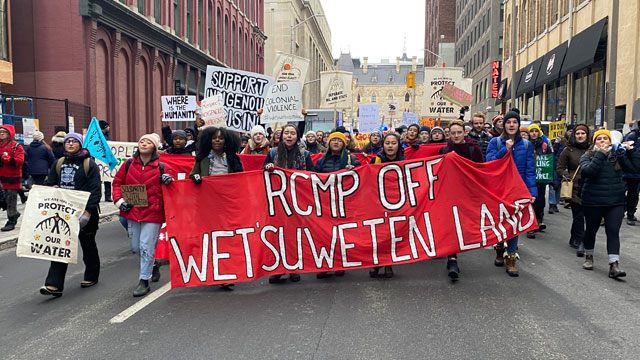The Students’ Society of McGill University (SSMU) Indigenous Affairs Committee and the Indigenous Student Alliance of McGill hosted a response to the Wet’suwet’en call for solidarity against a pipeline project. On Jan. 9, students gathered at the Y-intersection to support hereditary chiefs and the Unis’tot’en and Gidimt’en camps protesting Coastal GasLink’s plans to build a pipeline through their territory in Northern British Columbia (BC).
The Coastal GasLink pipeline project proposed by TC Energy (formerly TransCanada) will carry natural gas from Dawson Creek to an LNG Canada facility near Kitimat to be turned into liquified natural gas. While construction has already started on parts of the pipeline, protestors are continuing to block access to Wet’suwet’en territory.
Hereditary chiefs have explicitly opposed all pipeline activity since Sept. 3, 2015. They have been in conflict with TC Energy, Chevron, and Enbridge about pipelines through Wet’suwet’en territory. The BC Supreme Court issued an injunction against protestors, preventing them from denying Coastal GasLink access to the lands.
In response, the Wet’suwet’en have put out an international call for solidarity to respect Indigenous sovereignty and Indigenous peoples as the rightful title holders of the land. The international call began on Jan. 7, the one year anniversary of the Royal Canadian Mounted Police’s (RCMP) raid on protest camps, and lasted until Jan. 12.
As a large part of the pipeline’s route goes through Wet’suwet’en lands, Coastal GasLink has signed agreements with band councils to authorize construction. However, protestors deny that agreements made by band councils serve as free, prior, and informed consent on behalf of the Wet’suwet’en clans they represent.
Marlene Hale, a member of the Wet’suwet’en Frog Clan, spoke about the differences between the authority of hereditary chiefs and band councils, insisting that hereditary chiefs should dictate access to the land.
“[A hereditary chief] earns his title,” Marlene Hale said. “A band council chief is only there to do the administration […] they do not tell me what to do on the land”.
BC is the first province to enshrine the United Nations Declaration on the Rights of Indigenous Peoples (UNDRIP), and the Supreme Court of Canada has acknowledged the Wet’suwet’en lands are unceded territory. However, the BC Supreme Court granted the injunction on the basis that Coastal GasLink had met the legal requirements to begin building on the land.The five hereditary chiefs blocking the pipeline rejected the injunction. Dini’ze Na’moks of the Tsayu clan urged the BC government to respect Indigenous autonomy and their land.
“In this time of reconciliation, with BC being the first province to legislate UNDRIP, this ruling by a court in BC against Indigenous rights and recognition truly proves that industry, not the people, can control the Province and its laws,” Na’moks said. “Ultimately, we are our own government, and we decide who [is allowed] on our territory. We are the hereditary chiefs. British Columbia and Canada only have assumed and presumed authority on our lands.”
Tomas Jirousek, Indigenous Affairs Commissioner of McGill, explained the importance of Indigenous sovereignty within Canadian politics, noting that the events at Wet’suwet’en were emblematic to reconciliation.
“The issue at hand is one of Indigenous sovereignty,” Jirousek said. “Regardless of whether you support pipelines and the resource extraction, or not, we all maintain an obligation to recognize and respect the laws and customs of the Indigenous peoples of those territories.”
Event leaders urged the McGill community to hold federal and provincial leaders and RCMP accountable and to respect Indigenous sovereignty.
“Solidarity can take place through a few different forums, and will dictate and change the course of events in a few different ways,” Jirousek said. “Not everyone needs to become an activist, or donate money to show solidarity with the Wet’suwet’en. [Solidarity shows] that Canadians refuse to accept this incursion and disrespect shown towards the Wet’suwet’en.”
For students interested in the conflict between the Wet’suwet’en and the BC provincial government and Coastal GasLink, speakers and organizers have provided a supporter toolkit, designed to help allies in their own mobilisation efforts.








